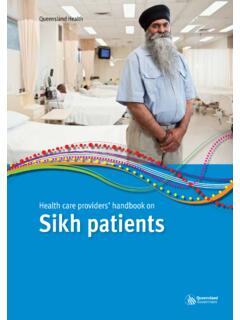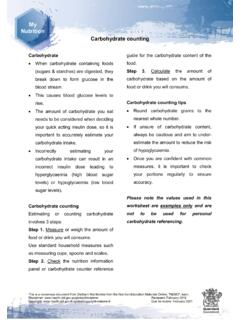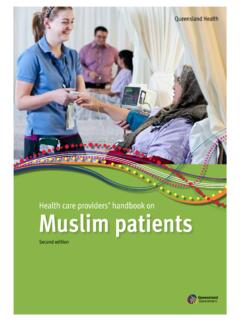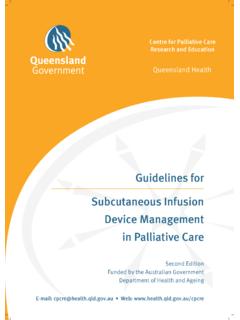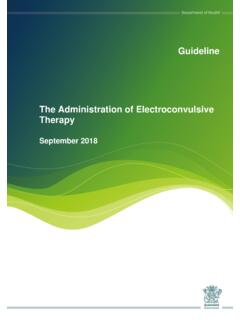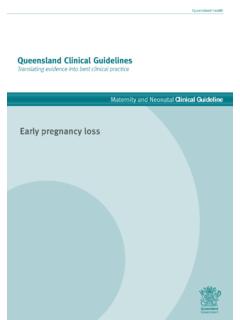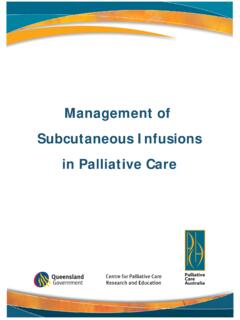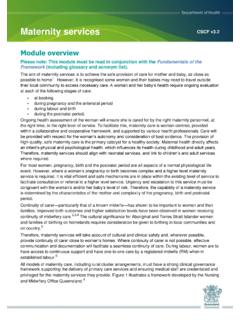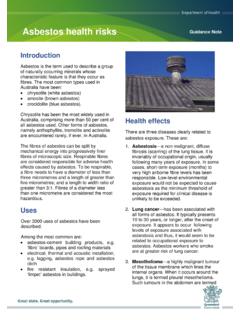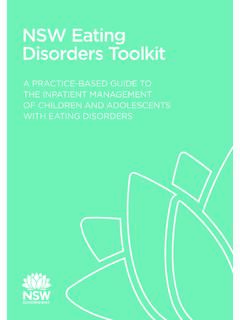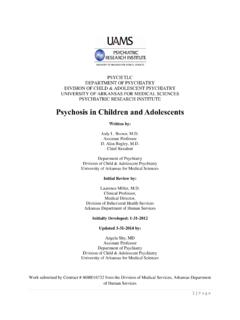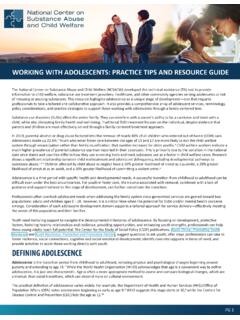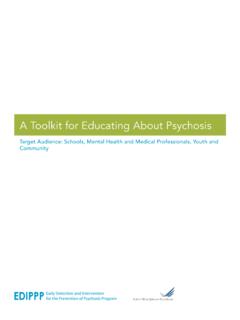Transcription of Caring for a person experiencing depression
1 Page 13 Caring for a person experiencingDepressionCase studyPhil is a 60 year old retired accountant. He has suffered from asthma most of his life. He has been admitted to hospital for treatment of pneumonia. He is taking medication for depression but despite this he appears very down. He reports that he has not been able to sleep, does not feel like eating and has not been interested in anything. He appears to be neglecting following information could help you nurse a patient like is depression ?
2 depression is extremely common, affecting one in five Australians over their lifetime. depression is a word often used to describe feelings of sadness and grief that all people experience at times. However, for a person to be clinically diagnosed with a depressive disorder, his or her symptoms are usually much more intense and must have been present for at least two weeks. depression is commonly accompanied by feelings of anxiety or agitation. Symptoms and types of depressionDepression is also referred to as a mood disorder.
3 The primary subtypes are major depression , dysthymia (chronic and usually milder depression ), and atypical depression . depression that begins or occurs during or after pregnancy is referred to as a type of perinatal mood disorder (which includes ante-natal and post-natal depression ). See the MIND Essentials resource Caring for a person experiencing mental illness in the perinatal period for more information. depression that occurs in conjunction with episodes of mania may be symptomatic of bipolar affective disorder.
4 See the MIND Essentials resource Caring for a person experiencing mania for more information. Core symptoms of depression include:u sleep disturbanceu appetite or weight changesu dysphoria (a bad mood , irritability, or sadness)u anhedonia (loss of interest in work, hobbies, sex, etc.)u fatigue (often manifesting as difficulty completing tasks)u agitation or retardation, especially in the elderlyu diminished concentration, difficulty with simple tasks, conversations 13 Page 14 Depressionu low self-esteem or feelings of guiltu suicidal thoughts present in two-thirds of people experiencing and adolescents may present with an irritable or cranky mood rather than being sad or , onset and course of depressionPeople may experience depression as a result of any one (or more)
5 Of a range of factors, including:u biochemistry u physical stress u chronic or sustained illnessu seasonal influences u genetic predispositionu life stressors u personality factorsDepression may have an acute or gradual onset and can be experienced any time over the course of a person s life. Difficulties in diagnosisDepression can be difficult to diagnose, as people may present complaining of physical problems, which may obscure a psychiatric diagnosis. Depressive disorders often coexist with, and may be secondary to, other mental disorders .
6 Particularly high rates of depression are found in people with alcohol-related disorders , eating disorders , schizophrenia and somatoform disorders (vague physical complaints with no physical basis). Determining which disorder is primary and which is secondary is often a difficult of the people nurses care for, both young and old, are at risk of developing depression due to longstanding physical illness and disability. Further, depression can present as an early sign of dementia. It is important then for nurses to remain alert to this possibility.
7 See Table 1 in the MIND Essentials resource Caring for a person with dementia for helpful information on the different features of depression and dementia. Page 14A person s perspective on what it is like to experience depression When I am depressed I feel raw, extremely sensitive and trapped in a black hole. I feel tired all the time because I struggle to sleep. One of the worst times is in the early hours of the morning because I wake up all alone in the darkness and everyone and everything in my world is asleep.
8 I find it so hard and hurtful when people tell me to pull myself together because I simply don t have the energy to get out of the black hole I m trapped in. I then feel like a failure because I can t pull myself together. DepressionSome reported reactions to people experiencing depressionNurses who have worked with people who are depressed have reported the following reactions:Disregard When depressive symptoms are seen as being able to be controlled, unacceptable or embellished, nurses may have difficulty understanding the person s experience.
9 This may lead to a minimisation or disregard for the person s symptoms. For example, common beliefs expressed are it s all in her mind or he should just get over it .Inadequacy Nurses can feel inadequate if strategies are not helpful in making a quick impact on the This can develop when suggested strategies by the nurse are unsuccessful and the person continues to feel hopeless and helpless. Hopelessness This can develop when the nurse feels completely unable to help the person , and as a result, become convinced by the person s belief that nothing can be done to help them.
10 Alternatively, the person s depression may cause the nurse to focus on his or her own sadness, leading to feelings are more likely if nurses lack knowledge about depression or if they have unrealistically high expectations of their capacity to help. This is particularly true if a nurse sees the person for only a short for nursing a person experiencing depressionAppropriate goals for Caring for a person with depression in a community or hospital setting include: u Develop a relationship with the person based on empathy and Promote the person s sense of positive Promote effective coping and problem solving skills in a way that is empowering to the Promote positive health behaviours, including medication compliance and healthy lifestyle choices (for example diet, exercise, not smoking, limit consumption of alcohol and other substances).
